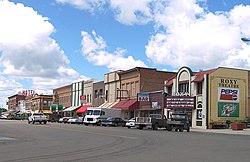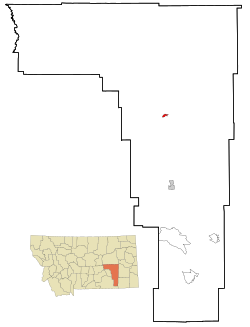Forsyth, MT
| Forsyth, Montana | |
|---|---|
| City | |

Downtown Forsyth
|
|
 Location of Forsyth, Montana |
|
| Coordinates: 46°16′0″N 106°40′40″W / 46.26667°N 106.67778°WCoordinates: 46°16′0″N 106°40′40″W / 46.26667°N 106.67778°W | |
| Country | United States |
| State | Montana |
| County | Rosebud |
| Area | |
| • Total | 0.99 sq mi (2.56 km2) |
| • Land | 0.99 sq mi (2.56 km2) |
| • Water | 0 sq mi (0 km2) |
| Elevation | 2,523 ft (769 m) |
| Population (2010) | |
| • Total | 1,777 |
| • Estimate (2016) | 1,869 |
| • Density | 1,800/sq mi (690/km2) |
| Time zone | Mountain (MST) (UTC-7) |
| • Summer (DST) | MDT (UTC-6) |
| ZIP code | 59327 |
| Area code(s) | 406 |
| FIPS code | 30-27700 |
| GNIS feature ID | 0771501 |
Forsyth is a city in and the county seat of Rosebud County, Montana, United States. The population was 1,777 at the 2010 census. Forsyth was established in 1876 as the first settlement on the Yellowstone River, and in 1882 residents named the town after General James William Forsyth who commanded Fort Maginnis, Montana during the Indian Wars and the 7th Cavalry at the Wounded Knee Massacre. The town has long been a transportation nexus, starting with steamboats on the river and progressing to the Northern Pacific Railway and Interstate 94.
Forsyth was established as a settlement on the Yellowstone in 1876 as a steamboat landing supporting United States Army operations in the Indian Wars.
in 1882, Thomas Alexander traded land to the Northern Pacific Railway to start the town, and developed four buildings on main street.
In 1894, 500 men of the socialist Coxey's Army inspired by Jacob Coxey and led by William Hogan, commandeered a Northern Pacific Railway train for a trip to Washington, DC. They fought Federal Marshals on the way, and were finally apprehended in Forsyth on April 25, with the help of the Army, by Troop L, Eighth Cavalry from Fort Keogh, the Cheyenne soldiers known as "Casey's scouts." This incident marked one of the few instances where Native American troops were used against whites. Although some escapes occurred, most of the Coxey's Army supporters were taken to Helena as prisoners.
...
Wikipedia
